

 Part Eight
WW1 Part Two
Part Eight
WW1 Part Two

Part Eight WW1 Part Two
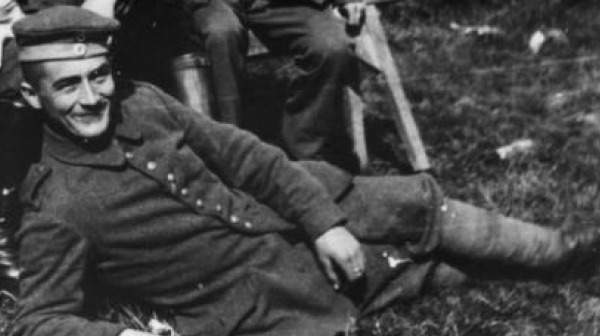
He had [just] come back fatigued after a delivery. I looked at him for the first time in my life. We stood eye to eye facing one another . . . . He was like a skeleton, his face pale and colorless. Two piercingly dark eyes, which struck me especially, stared out of deep sockets. His prominent mustache was unkempt. Forehead and facial expression suggested high intelligence. I can still see him today as he stood before me then, loosening his belt buckle. Along with Mund Max, Adolf Hitler became my inseparable comrade.
Brandmayer delivers his own first dispatch this day, along a "path [that] offered little protection from artillery fire and one was not even covered against machine-gun activity . . . . [Hitler was] in a corner with his head buried in a newspaper, sipping from time to time from a field kettle filled with hot tea . . . . Sleep overcame us and took us softly into its arms. 1When he [Hitler] was not fired at, he would often say on his return: "Today an old woman would have had no trouble in getting through" . . . . Hitler often looked completely exhausted; the best nerves can fail. However, he always pulled himself together . . . . I never saw him receive a field packet. Nor would he accept presents from us, though we often made the offer. Occasionally he refused with a brief thank you [and] was uninterested in home leave. The trenches and Fromelles were his world and what lay beyond did not exist for him. 2
Josef Stettner:Some worshipers of Hitler have pointed out that the job of a dispatch runner was more dangerous than that of a soldier in the trenches. While the troops in the first line could calmly lie under cover, it is said in Hitler's defense, the dispatch runners would have been much more exposed to enemy fire while on duty. However, I can accept that only for dispatch runners of companies or maybe also of battalions. In the worst-case scenario, the regimental dispatch runner had to go to the dugout of a battalion which still lay far behind the first line. And even in those cases, it was for the most part the dispatch runners of the battalions themselves that had to pick up the messages at regimental headquarters, particularly when things were getting dangerous. All the duties of a regimental dispatch runner lay outside the dangerous zone of machine-gun fire. 3
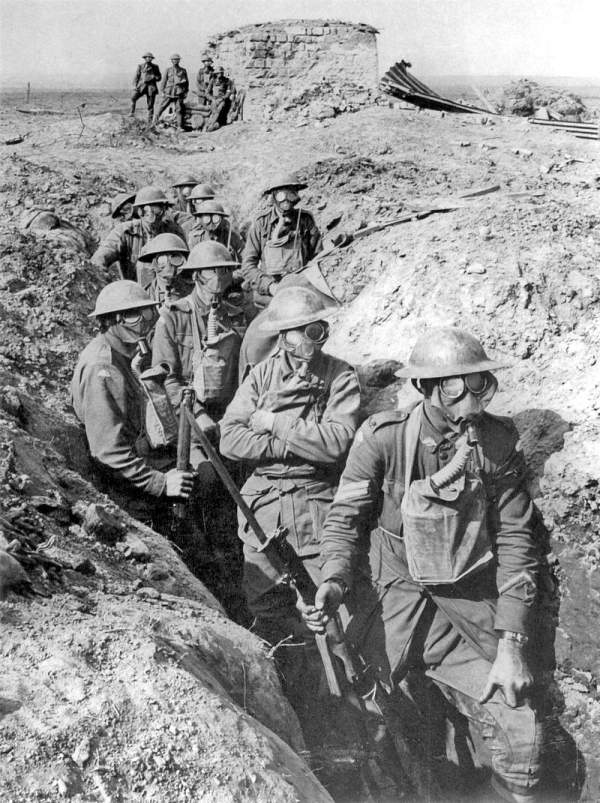
I keep waiting with baited breath to see when we shall start to fight and enforce peace. I don't believe that the Englishmen would give up so easily without actually being beaten . . . but then they won't have anything to laugh about, because everyone here has a fanatical hatred of the enemy . . . . one should never take prisoners; they should all be killed. 4
From Adolf Hitler's Mein Kampf:In the summer of 1915 the first enemy leaflets were dropped on our trenches. They all told more or less the same story, with some variations in the form of it. The story was that distress was steadily on the increase in Germany; that the War would last indefinitely; that the prospect of victory for us was becoming fainter day after day; that the people at home were yearning for peace, but that "Militarism" and the "Kaiser" would not permit it; that the world—which knew this very well—was not waging war against the German people but only against the man who was exclusively responsible, the Kaiser; that until this enemy of world-peace was removed there could be no end to the conflict; but that when the War was over the liberal and democratic nations would receive the Germans as colleagues in the League for World Peace. This would be done the moment "Prussian Militarism" had been finally destroyed.
To illustrate and substantiate all these statements, the leaflets very often contained "Letters from Home", the contents of which appeared to confirm the enemy's propagandist message.
Generally speaking, we only laughed at all these efforts. The leaflets were read, sent to base headquarters, then forgotten until a favorable wind once again blew a fresh contingent into the trenches. These were mostly dropped from airplanes which were used specially for that purpose.
One feature of this propaganda was very striking. It was that in sections where Bavarian troops were stationed every effort was made by the enemy propagandists to stir up feeling against the Prussians, assuring the soldiers that Prussia and Prussia alone was the guilty party who was responsible for bringing on and continuing the War, and that there was no hostility whatsoever towards the Bavarians; but that there could be no possibility of coming to their assistance so long as they continued to serve Prussian interests and helped to pull the Prussian chestnuts out of the fire.
This persistent propaganda began to have a real influence on our soldiers in 1915. The feeling against Prussia grew quite noticeable among the Bavarian troops, but those in authority did nothing to counteract it. This was something more than a mere crime of omission; for sooner or later not only the Prussians were bound to have to atone severely for it but the whole German nation and consequently the Bavarians themselves also.
In this direction the enemy propaganda began to achieve undoubted success from 1916 onwards. 5
He [Hitler] seemed to think the English understood propaganda better than we did. He expected headquarters would contradict the leaflets, but they never did. Nothing was done to counteract the bad effects of these enemy leaflets. 6
1915 August 5 The Germans capture Warsaw from the Russians.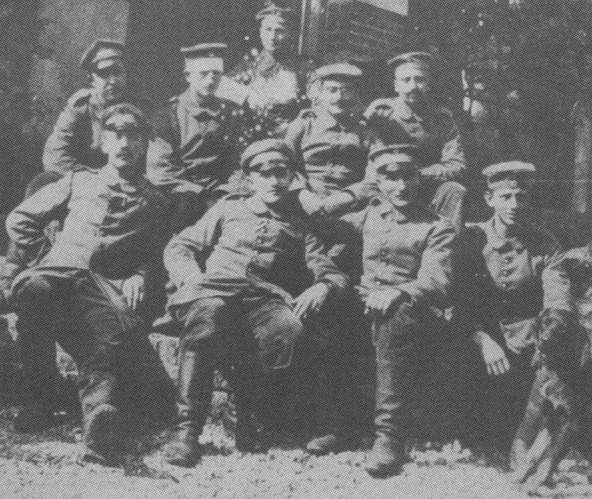
Stones and iron fragments whizzed above our heads. We bent low, racing across open country. I could scarcely lift myself from the ground any more [and] still Hitler urged me onwards, onwards! I cannot understand how Hitler could look around, with no cover . . . while calling to me: "Brandmoari, get up!" He seemed without nerves . . . . Sweat dug deep rivulets into our faces. More falling than running, we reached the command dugout. Paralyzing tiredness weighed like lead on my burning limbs. I threw off my helmet and webbing and sank, dead-tired, into my bunk. I expected Adolf to do the same, but how wrong I was! As I turned around, I saw him sitting near the exit, helmet on head, buckled up, and waiting for the next order. "You're crazy!" I cried out angrily. "How would you know?" was his prompt reply. There was no man under his uniform, only a skeleton . . . . He had an iron nature. 7
Alexander Moritz Frey, in 1946, will recall his wartime encounters with Adolf Hitler:Although we were assigned different duties, we encountered one another quite often. Taken out of our companies, we were both assigned to regimental HQ . . . . As a subordinate, Hitler had to bring news, and the like, to the battalion HQs . . . . Claims that he [Hitler] was cowardly are untrue. But he was also not courageous—he lacked the requisite composure. He was always alert, ready for action, conniving, very much caring about himself; all comradeship was a facade, put on in order to make himself popular and to make a striking impression.
Without a doubt, Hitler could have re-enlisted with a company and done trench duty, with the goal of promotion. But he did not seem to have wanted that; there were certain positions, so treasured that if troops got hold of them, they would not want to give them up, as they had certain automatic advantages. In this case, these were better quarters and better food than infantrymen in the trenches had. I had to resist the urging of my company commander that I leave my post in the medical service (since I was not a doctor, I couldn't go much further in this particular field) and take part in an officer training course. I did not want to leave my field of work—probably for the same reasons that Hitler did not want to leave his. Measured against the dreadful hardships of trench duty, our posting was a small alleviation, combined with small comforts. 8
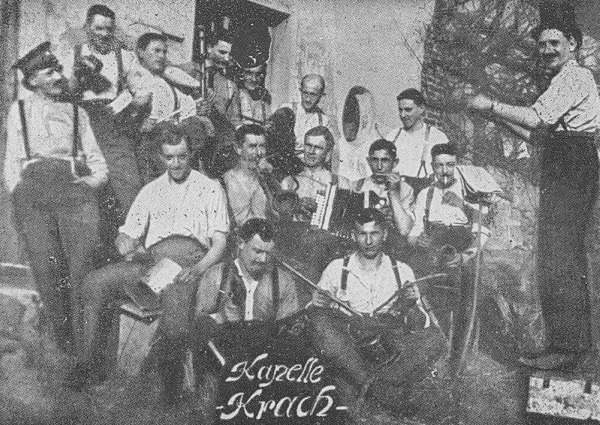
I often go on bitter nights
To Wotan's oak in the quiet glade
With dark powers to weave a union—
The runic letters the moon makes with its magic spell
And all who are full of impudence during the day
Are made small by the magic formula!
They draw shining steel—but instead of going into combat
They solidify into stalagmites.
So the false ones part from the real ones—
I reach into a nest of words
And then give to the good and just
With my formula blessings and prosperity. 11
Many lay in wet clothes, with a high fever, on wet bunks in the barracks. Only a few were able to dry their uniforms in the ovens installed there; most, therefore, returned on the march to the Front with the same wet covering they'd arrived in. Clinging to the body and soaked through with mud and dirt, these bits of uniform offered no protection at all against the cold. Mass illness was the inevitable consequence, and whole companies had to be placed on sick leave by the doctor. The only advantage our troops had during the wet season was that they had no fear of attack by the enemy, for they were just as badly off. 12
1915 December 19 The Allies begin the evacuation of Gallipoli. Many of these battle-hardened veterans will soon begin to join the troops from Australia and New Zealand, who will be facing the List Regiment at Fromelles and Fournes in Feb-June 1916. 13During the three days of Christmas, he [Hitler] spoke not a word to anyone, and we were unable to explain why he was so surly. At that time, he was perhaps taking it to heart that everyone at home had forgotten him, and that nobody had sent either a Christmas greeting or present . . . . When he returned from a mission on Christmas Day, he sat deep in thought, sunk in a corner with his helmet still on his head, and no one was capable of stirring him out of his apathy. 14
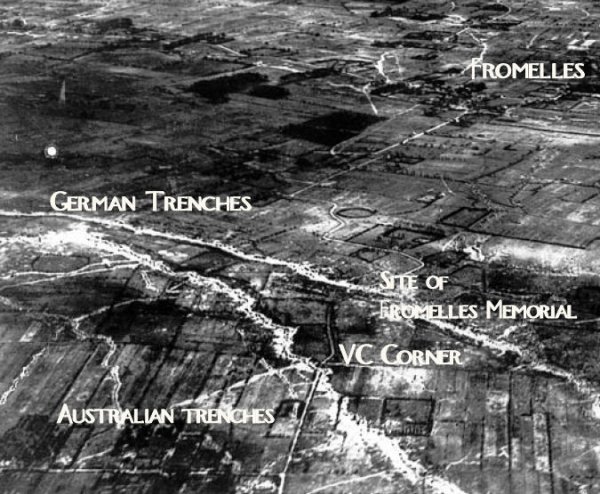
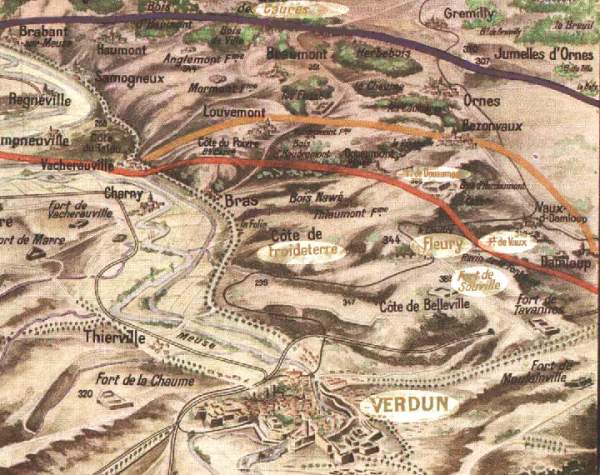
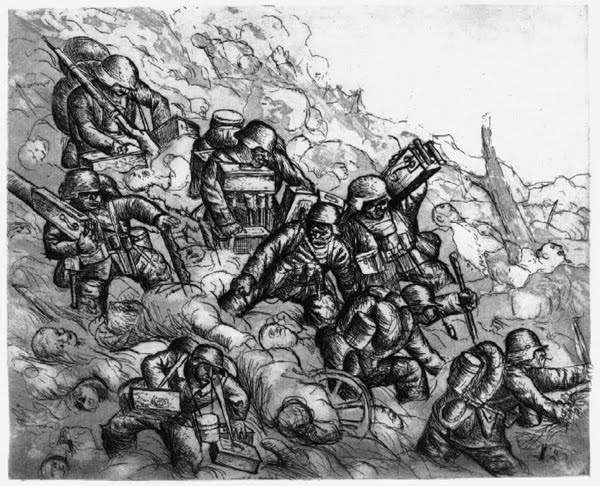
At 1:45 PM this took on the distinct character of a barrage, from the right and left flanks as well as the Front, fire came from heavy and medium mortars. The fire from the English artillery and mortars abated temporarily, only to swell by fits and starts to greater violence . . . . At 5 PM Englishmen reported [as being] in front of the Australian position were immediately brought under fire . . . . The [dispatch runners] came back reporting our trenches under the heaviest barrage, losses considerable, and the damage to the position severe. 22
Hitler's fellow dispatch runner, Balthasar Brandmayer, will later write:[The runners] carried message after message from and to the trenches. Glaring flares lit our way. The Australians stormed for the fifth time vainly across the battlefield. Those who escaped the rain of bullets from our machine-guns, found certain death in the hurricane of the German artillery fire . . . . I dashed with Hitler to the battle HQ of the 17th Regiment. He scarcely gave me time to get my breath back [before] we ran on to 21st Regiment. Grenades chased us through the darkness of the night; we rolled in time with them into a water-filled mine crater. The light of a high-flying flare first gave us an instance of orientation again. "Now push on!" said Hitler, and we scrambled up the crater wall. Wet through to above the chest, our trousers and shirts stuck to our bodies. And how we froze! The envelope and paper we handed the regimental commander were soggy. He was scarcely able to decipher the report. 23
This action proves to be the List Regiment's proudest single action of the war, and the worst defeat in Australia's short combat history. Launched as a diversion to discourage the Germans from reinforcing their troops during the Battle of the Somme, the result is a massacre of the 15th Australian brigade. From the Imperial War Graves Commission:The Australian left and center of the 5th Division reached the German trenches and held their second line during the day and night, but the right was held off by a fierce machine-gun barrage and only reached the [front line] in isolated groups. The action was broken off in the morning of the 20th, after the 5th Australian Division had lost over 5,000 [5,553—1,917 killed, 3,146 wounded, and 470 taken prisoner] officers and men. 24
From the official Bavarian history:Since the beginning of the great battle of the Somme, and even earlier, the enemy had endeavored to divert attention and strength on the German side again and again in other directions. So it was to the west of Lille near Fromelles, where the 6th BRD . . . lay, and where from mid-June on, it became ever livelier. On 19 July at 12:30 PM a barrage of cannon-fire and mortars was laid down [in] the sector occupied by the 21st, 16th, and 17th RIRs . . . . But the batteries of the 6th BRD, for which the overwhelming English superiority in guns and aircraft made it certainly difficult to cope, in spite of this didn't hesitate to pour demoralizing fire into the English position, where English storm troops were assembled . . . . So the English attack, which finally left the trenches at 6:30 PM, had already had its backbone broken. In cold blood and filled with jubilation, the men of the 16th RIR awaited [the] English attack and struck it down bloodily . . . . In effect, the strength of the three regiments . . . succeeded by the early morning of 20 July in gradually freeing their position of English troops, massacring them or cutting them off. The booty included 500 prisoners and 20 machine guns. The 6th BRD can glory [in the fact] that, without help, it had frustrated the intentions of the enemy. 25
1916 August 10 End of the Brusilov Offensive.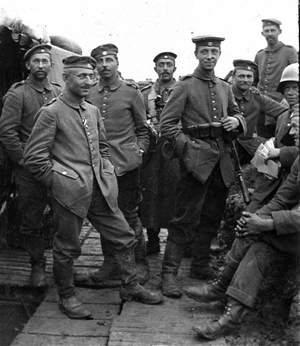
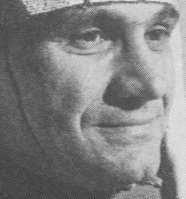
For the 16th RIR, the Battle of the Somme was no action in which clear and unequivocal orders were sent to the lines. On the contrary, it consisted of a shattering muddle, evoked through orders, countermanded orders, and contradictory reports. It consisted of little and infrequent contact between companies, battalions, and the regiment: the battle rather disintegrating into individual actions, which one sought, in so far as possible, subsequently to coordinate . . . . . 29
In some companies, a quarter to one third of the men suffered severely from dysentery, exacerbated by cold food, inclement weather, and the lack of dry bunks. The continual lack of rest at night became exhausting; the constant artillery fire wore down the nerves. The companies needed relief urgently [but] requests sent by the regiment to the brigade were denied: if the men would only hold out for a short time, the division would surely be relieved soon. The man in the trenches began to hope [for] relief the following night; the more he summoned strength for this, the greater he fell [victim] for disappointment, when he saw himself deceived in his expectations. After this occurrence was repeated two or three times, a destructive sense of abandonment began to take hold. Otherwise peaceful and rational men became irrational, and started to air this mood in reports and requests. 30
Dead and buried everywhere . . . . We fell from shell hole to shell hole. Multicolored flares arched heavenwards, and burst into countless streams. This was always the moment after which we leapt for another freshly turned-up crater in which to disappear . . . . Shrapnel, filth, and iron rained mercilessly down on us. The blood almost stagnated in my arteries . . . it could only be a few seconds longer—then, yes—then an armored-steel force ripped at bodies already scratched and torn . . . . My nerve failed. I just wanted to lie where I was, I sank hopelessly into insupportable apathy . . . . Then Hitler spoke kindly to me, gave me words of encouragement, said that someday all our heroism would be rewarded a thousand fold in the Fatherland . . . . We returned . . . uninjured. Our faces were no longer recognizable. 31
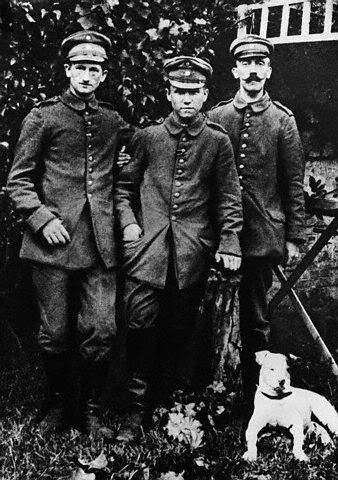
Schmidt, Amann, Hitler, Fuchsl]
"It's not so bad, captain, right? I'll stay with you? Stay with the regiment?" There he lay, the man who so badly wanted to be an artist, who loved all newspapers, who philosophized about political and ideological questions in the primitive manner of ordinary people. There he lay, wounded, and had no other wish than to be allowed to stay with his regiment. He had no family and also, if one might say, no homeland. For Gefreiter Hitler, the List Regiment was home. 34
From Adolf Hitler's Mein Kampf:Even in the early stages of the war the soldiers were sometimes prone to complain; but such criticism was confined to 'internal affairs'. The man who at one moment groused and grumbled, ceased his murmur after a few moments and went about his duty silently, as if everything were in order. The company, which had given signs of discontent a moment earlier, hung on now to its bit of trench, defending it tooth and nail, as if Germany's fate depended on these few hundred yards of mud and shell-holes. The glorious old army was still at its post. A sudden change in my own fortunes soon placed me in a position where I had first-hand experience of the contrast between this old army and the home front. At the end of September 1916, my division was sent into the Battle of the Somme. For us, this was the first of a series of heavy engagements, and the impression created was that of a veritable inferno, rather than war. Through weeks of incessant artillery bombardment, we stood firm: at times ceding a little ground, but then taking it back again, and never giving way. On October 7th, 1916, I was wounded, but had the luck of being able to get back to our lines, and was then ordered to be sent by ambulance train to Germany.
Two years had passed since I had left home, an almost endless period in such circumstances. I could hardly imagine what Germans looked like without uniforms. In the clearing hospital at Hermies, I was startled when I suddenly heard the voice of a German woman who was acting as nursing sister and talking with one of the wounded men lying near me. Two years! And then this voice for the first time!
The nearer our ambulance train approached the German frontier, the more restless each one of us became. En route, we recognized all these places through which we passed two years before, as young volunteers—Brussels, Louvain, Liège—and finally we thought we recognized the first German homestead, with its familiar high gables and picturesque window-shutters. Home!
What a change! From the mud of the Somme battlefields to the spotless white beds in this wonderful building. One hesitated at first before entering them. It was only by slow stages that one could grow accustomed to this new world again. But unfortunately there were certain other aspects also, in which this new world was different. 35
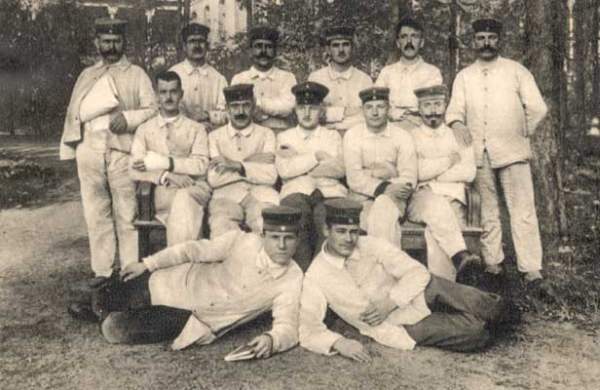
Hitler never hesitated in the least in carrying out even the most difficult order, and very often took on the most dangerous duties for his comrades. Couriers for the regimental staff had to be among the most reliable people, because serving as a regimental courier during battles and skirmishes required iron nerves and a cool head. Hitler always did his duty, and even after his severe thigh wound, [he] volunteered to be sent back to his regiment from the reserve battalion, immediately after his release from the hospital. 39
1916 December Hitler is given a pass to visit the Nationalgalerie in Berlin, where he is said to have become depressed after hearing Berliners mouth "defeatist" statements against the war. Ignaz Westenkirchner: "Hitler could hardly believe his ears. What they said might be true, but it was unworthy and unsoldierly." 40As soon as I was able to walk once again I obtained leave to visit Berlin. Bitter want was in evidence everywhere. The metropolis, with its teeming millions, was suffering from hunger. The talk that was current in the various places of refreshment and hospices visited by the soldiers was much the same as that in our hospital. The impression given was that these agitators purposely singled out such places in order to spread their views. But in Munich, conditions were far worse. After my discharge from hospital, I was sent to a reserve battalion there. I felt as [if] in some strange town. Anger, discontent, complaints met one's ears wherever one went. To a certain extent, this was due to the infinitely maladroit manner in which the soldiers who had returned from the front were treated by the non-commissioned officers who had never seen a day's active service, and who on that account were partly incapable of adopting the proper attitude towards the old soldiers. Naturally those old soldiers displayed certain characteristics [that] had been developed from [their] experiences in the trenches. The officers of the reserve units could not understand these peculiarities, whereas the officer home from active service was at least in a position to understand them for himself. As a result, he received more respect from the men than officers at the home headquarters [did]. But, apart from all this, the general spirit was deplorable. The art of shirking was looked upon as almost a proof of higher intelligence, and devotion to duty was considered a sign of weakness or bigotry. 41
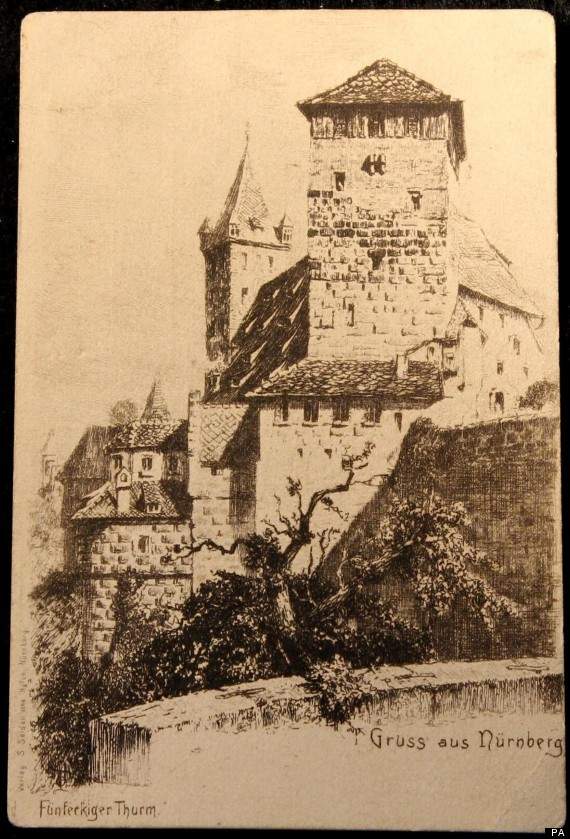
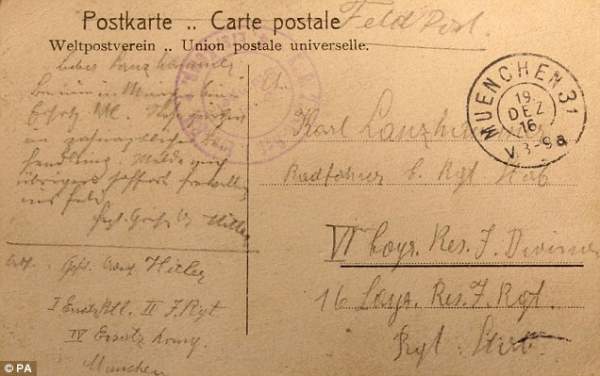
Dear Lanzhammer, I am now in Munich at the Ersatz Btl (battalion). Currently, I am under dental treatment. By the way, I will report voluntarily for the field immediately. Kind regards A. Hitler. 113
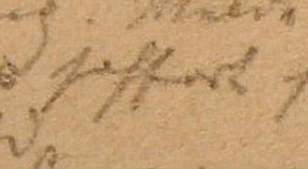
After a long residence in a military hospital, I have for some weeks been in Munich, with the reinforcement battalion of the 2nd Infantry Regiment. I am again fit for field service and, as I have heard, will shortly be posted by reinforcement transport, for active service with the 2nd Infantry Regiment. My captain will understand that it is my pressing wish to be with my old regiment and old comrades. I ask that my captain request that I return to the 16th RIR. 42
1917 February 1 Germany's unrestricted submarine warfare campaign begins.Most regrettable is the fate of the French civilian population, which, in the implementation of [Operation] Albrich, has been ordered to be moved out of the area to be vacated prior to the destruction of their towns and villages. While traveling to the Command of the Third Army, I came across several groups of these unfortunate people, who trudged, laden with bundles, to the available rows of automobiles or trains. 43
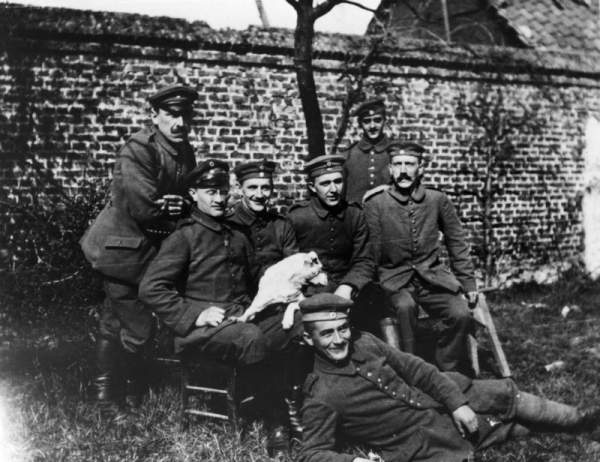 From Left to Right: Standing—Sperl, Max Mund. Sitting—Vergolder, George Wimmer, Josef Inkofer, Hitler. Lying—Balthasar Brandmayer
From Left to Right: Standing—Sperl, Max Mund. Sitting—Vergolder, George Wimmer, Josef Inkofer, Hitler. Lying—Balthasar Brandmayer
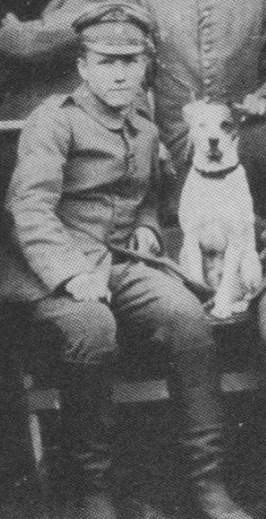
Soon we [Meyer, with Hitler] had to leave this [cover] behind and make our way across open ground. The track led us past two [enemy] forward field guns. Scarcely had we entered the vicinity, when the enemy welcomed us with murderous fire. We realized immediately that we could be observed . . . . Had I been on my own, without thinking, I would have made for deep cover . . . . My companion was of another mind. Without the slightest hesitation he sought, while taking every possible advantage of cover, to get out of that witches' kettle quickly. Naturally [I] had to follow. And it was just as well. Both of us came out unwounded from the danger zone. Two hours passed while we visited the two battalions. We set out on our return journey.
Scarcely had we arrived in the vicinity of the two guns when the enemy began employing his magic afresh. Understandably, we did not stop this time and, unhurt but covered in sweat, we reached safety . . . . The dispatch runner Hitler was assigned to accompany me on several more occasions, and every time we came out unharmed. 45
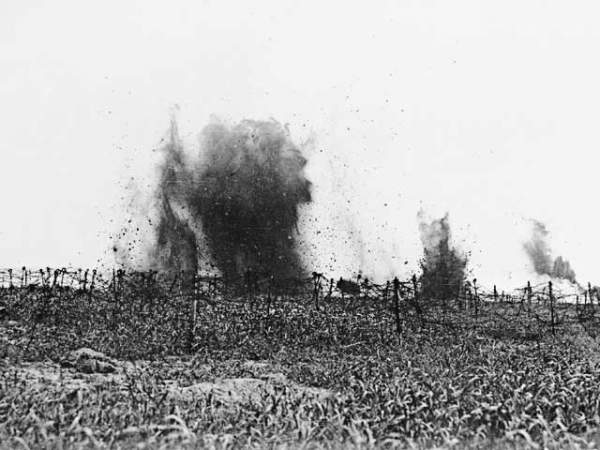
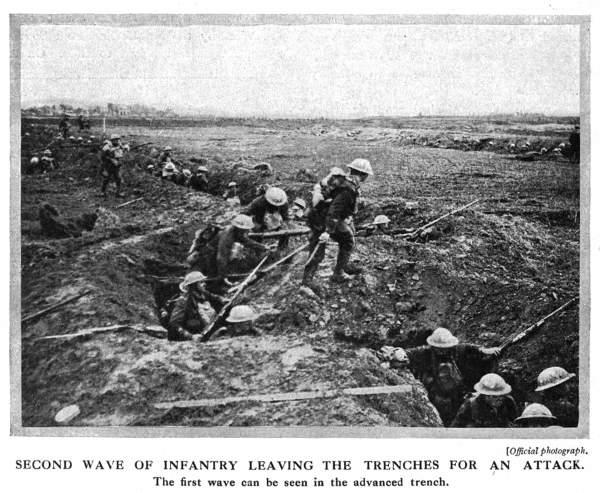
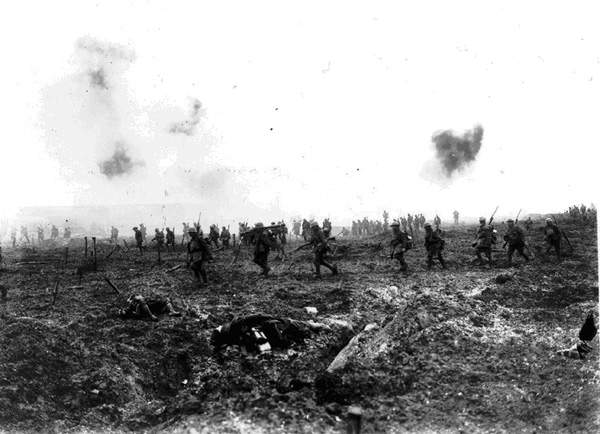
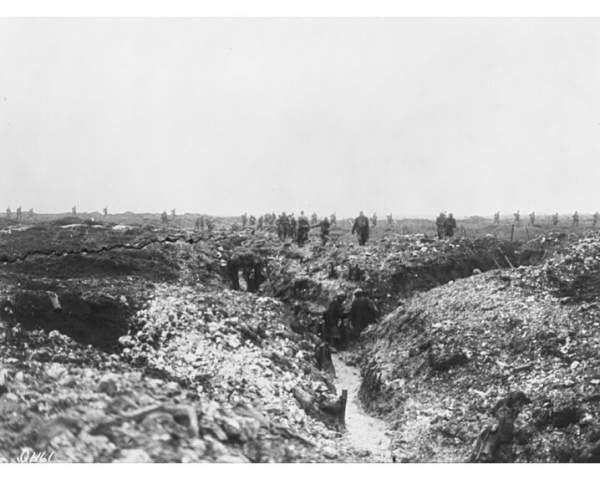
At 4:40 AM . . . the 38th Division advanced in an assault on Roeux . . . . Our regiment covered the right flank [but] the attack by the division broke down. At 9 o'clock the English massed a counter-attack [which] was repulsed. 50
1917 May 19 The 16th RIR, having lost 149 men in the battles of Arras and Vimy Ridge, is relieved and pulled off the front lines. 51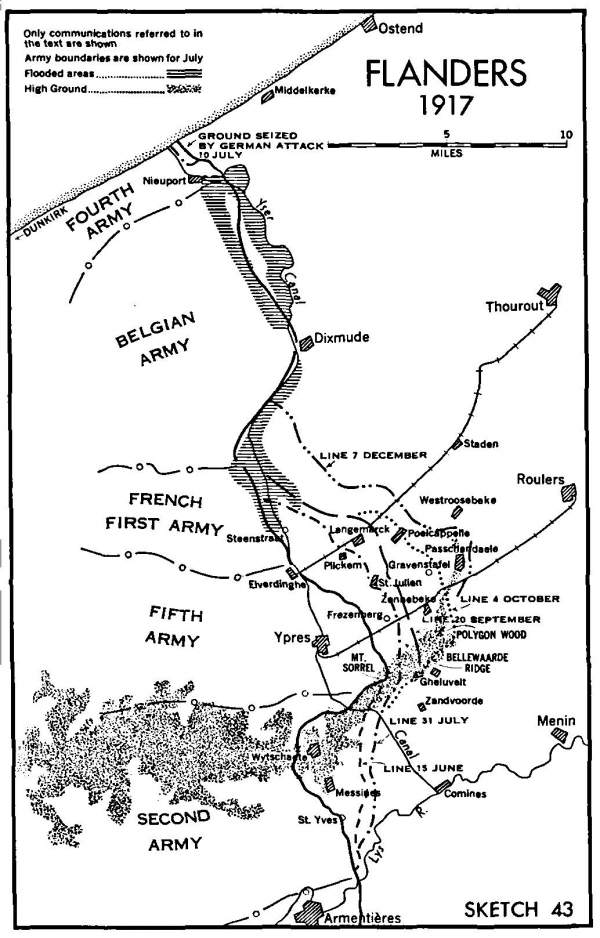
Thank God, we are out of filthy France, which just has suffered too much under the war. We are being deployed to where the blood of so many 16ers had already been spilled in 1914-15 . . . . Hopefully, peace for which we have longed so much is near. 53
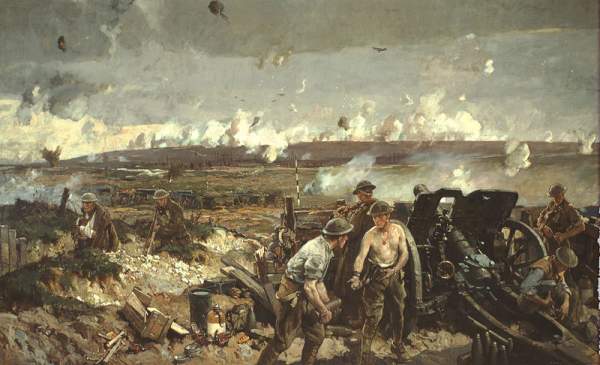
At the end of September, my division occupied, for the third time, those positions which we had once taken by storm as young volunteers. What a memory!
Here we had received our baptism of fire, in October and November 1914. With a burning love of the homeland in their hearts, and a song on their lips, our young regiment went into action as if going to a dance. The dearest blood was given freely here, in the belief that it was shed to protect the freedom and independence of the Fatherland.
In July 1917 we set foot for the second time on what we regarded as sacred soil. Were not our best comrades at rest here, some of them little more than boys — the soldiers who had rushed into death for their country's sake, their eyes glowing with enthusiastic love.
The older ones among us, who had been with the regiment from the beginning, were deeply moved as we stood on this sacred spot, where we had sworn "Loyalty and Duty unto Death". Three years ago, the regiment had taken this position by storm; now it was called upon to defend it in a grueling struggle. 54
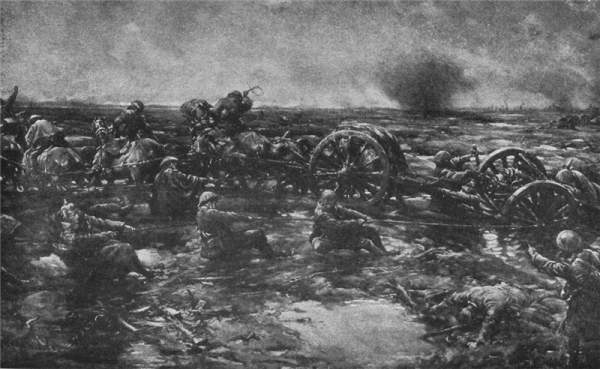
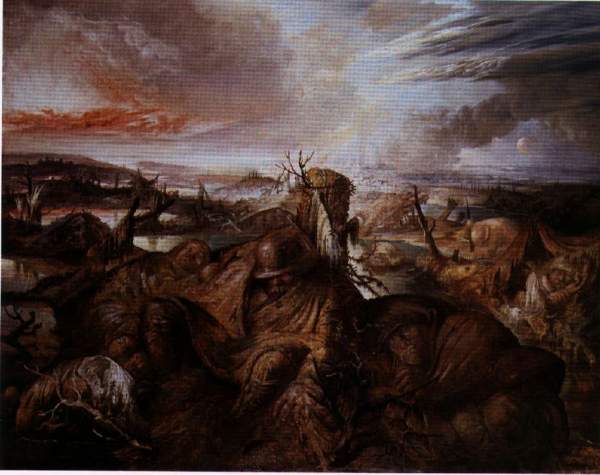
At midday, two machine gun companies from the Reserve Infantry Regiment 238 arrived as reinforcements. They had to be sent out in small groups from regimental headquarters . . . . Two officers (including myself) and the six dispatch runners led the way. From a hollow that protected us from observation, we had to cross some 200 metres, fully observed, of unprotected open land. Because of the heavy machine guns and ammunition cases, we had to keep to the road, [where] we were subjected to heavy artillery fire and also . . . machine guns. I can still see, to this day, two English tanks which had been brought to a stop by our main artillery on the main road from Ypres to Menin, but continued to give service in spite of it all by fearlessly spraying us with their machine guns. 58
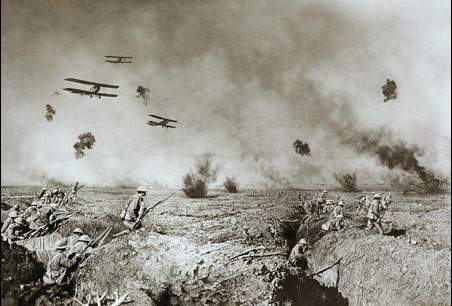
With an artillery bombardment that lasted three weeks, the English prepared for their great offensive in Flanders. There, the spirits of the dead seemed to live again. The regiment dug itself into the mud, clung to its shell-holes and craters, neither flinching nor wavering, but growing smaller in numbers day after day. Finally the British launched their attack on July 31st, 1917.
We were relieved in the beginning of August. The regiment had dwindled down to a few companies, who staggered back, mud-crusted, more like phantoms than human beings. Besides a few hundred yards of shell-holes, death was the only reward which the English gained. 59
I remember, it was before we arrived at Colmar. The railway employee who coveted Foxl came again to our carriage and offered me two hundred marks. "You could offer me two hundred thousand, and you wouldn't get him!" When I left the train at Harpsheim, I suddenly noticed that the dog had disappeared . . . I was desperate. The swine who stole my dog doesn't realize what he did to me. 60
The camp they are guarding is near Mulhouse, in Alsace, the only section of the front on German soil. During this slow time, not only will Hitler and his comrades get a well-deserved respite from the rigors of trench warfare, but the heavily censored news from the front seems to be improving as well. The news of the collapse of the Russian front, and the further defeats of Italian arms is, however, tempered by the news that German munitions workers have gone on strike. This mix of events give an impression that the war on the front is going well, but being undermined by defeatism on the home front. 61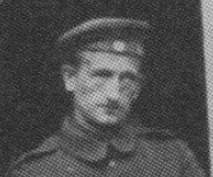
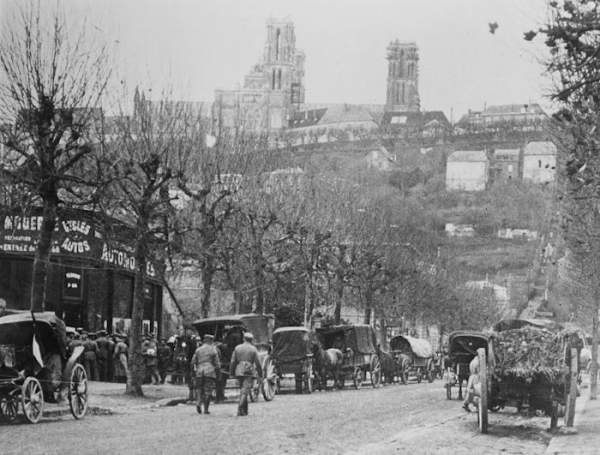
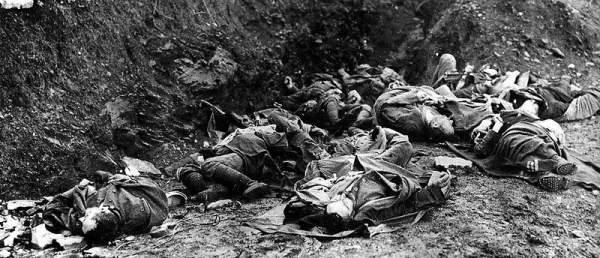
The spirit among the troops is high and confidant. The news of victory from the Italian front had a particularly reinvigorating effect on the morale of the troops. 65
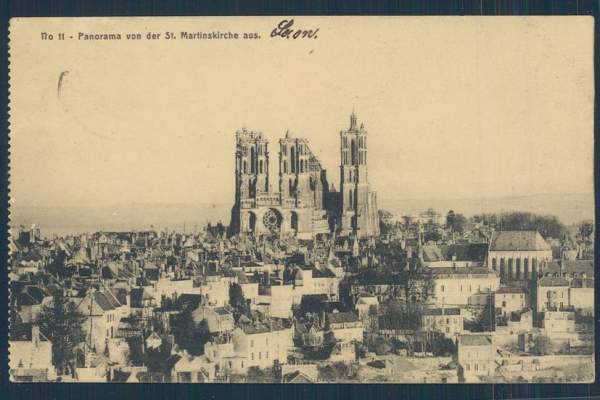
Towards the end of 1917, it seemed as if we had got over the worst phases of moral depression at the front. After the Russian collapse, the whole army recovered its courage and hope, and all were gradually becoming more and more convinced that the struggle would end in our favor. We could sing once again. The ravens were ceasing to croak. Faith in the future of the Fatherland was once more in the ascendant.
The Italian collapse in the autumn of 1917 had a wonderful effect; for this victory proved that it was possible to break through another front besides the Russian. This inspiring thought now became dominant in the minds of millions at the front, and encouraged them to look forward with confidence to the spring of 1918. It was quite obvious that the enemy was in a state of depression. During this winter, the front was somewhat quieter than usual. But that was the calm before the storm. 66
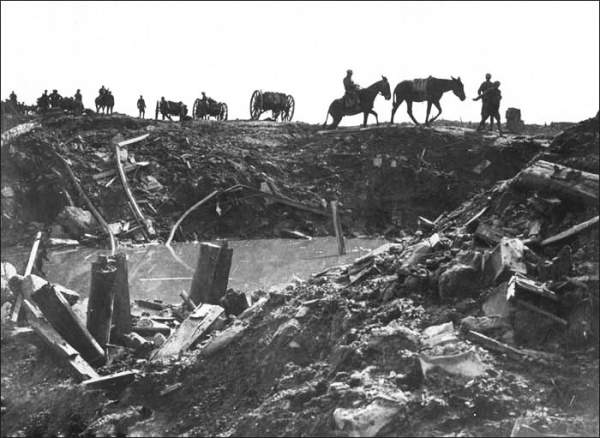
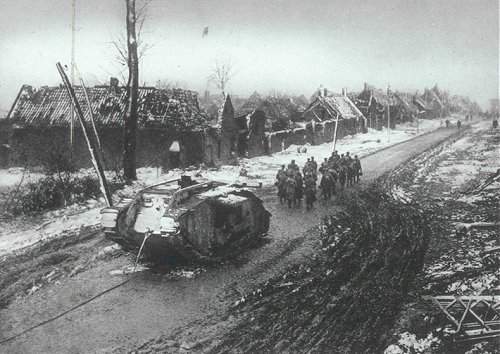
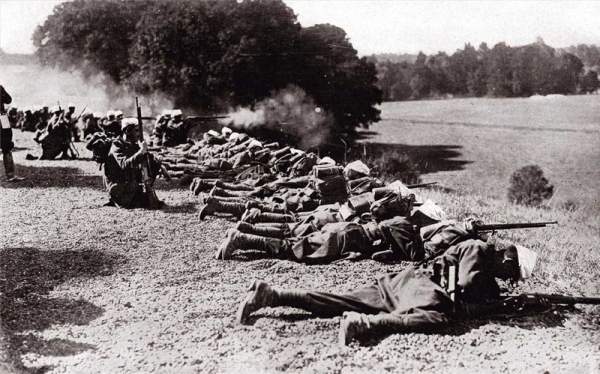
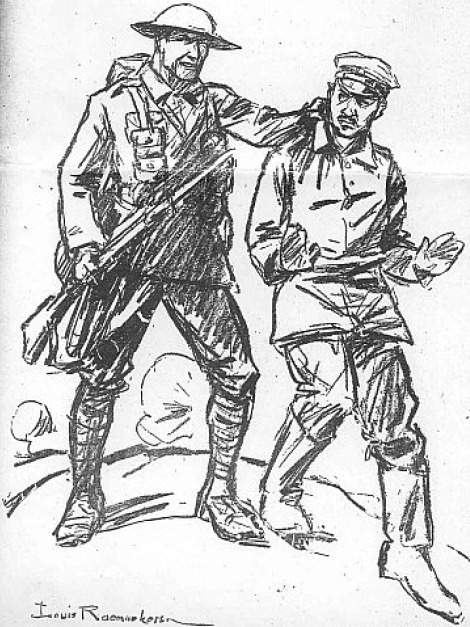
What a wonderful time! Misery and need are quickly forgotten. Anxiety and fear, through the long war years, have become unknown conceptions. So the visits, each day, of aviators dropping bombs does not disrupt in the least our royal Bavarian rest . . . . [I received a letter from my girlfriend] Hitler saw this and asked in a good-humored tone: "Brandmoari, has Trutschnelda written again?" Good guess," I retorted. "Have you never wanted a girl?" I asked. "Look Brandmoari, I've never found time for such a thing," Hitler replied. "And I don't want to," he continued. "You're a strange one, Adi! I'll never understand you," I replied. "There's no hope for you." . . . .
[Another time someone said] "How would it be if I found a mam'selle for us?" . . . "I'd kill myself from shame rather than make love to a French woman", Hitler leapt excitedly into the discussion. The effect of the moment was raucous laughter. "Listen to the monk!" cried one. Hitler's face became serious. "Don't any of you feel your honor as a German any more?" 69
Just when preparations were being made to launch a final offensive which would bring this seemingly eternal struggle to an end, while endless columns of transports were bringing men and munitions to the front, and while the men were being trained for that final onslaught, then it was, that the greatest act of treachery during the whole war was accomplished in Germany.
Germany must not win the War. At that moment, when victory seemed ready to alight on the German standards, a conspiracy was arranged for the purpose of striking at the heart of the German spring offensive with one blow from the rear, and thus making victory impossible. A general strike in the munitions factories was organized.
If this conspiracy could achieve its purpose, the German front would have collapsed, and the wishes of the Vorwärts (the organ of the Social-Democratic Party) that, this time, victory should not take the side of the German banners, would have been fulfilled. For want of munitions, the front would be broken through within a few weeks, the offensive would be effectively stopped, and the Entente saved. Then, International Finance would assume control over Germany, and the internal objective of the Marxist national betrayal would be achieved. That objective was the destruction of the national economic system, and the establishment of international capitalistic domination in its stead. And this goal has really been reached, thanks to the stupid credulity of the one side, and the unspeakable treachery of the other.
The munitions strike, however, did not bring the final success that had been hoped for: namely, to starve the front of ammunition. It lasted too short a time for the lack of ammunitions, as such, to bring disaster to the army, as was originally planned. But the moral damage was much more terrible. 71
We all felt within us the approach of the long-desired peace. Peace—the tug of the homeland—already these thoughts in themselves gave us courage and the confidence to endure patiently the few months that the war on the battlefields of France would perhaps still last. With songs of home on their lips again, for the first time in years, the fighting battalions of the glorious List Regiment pushed on. 72
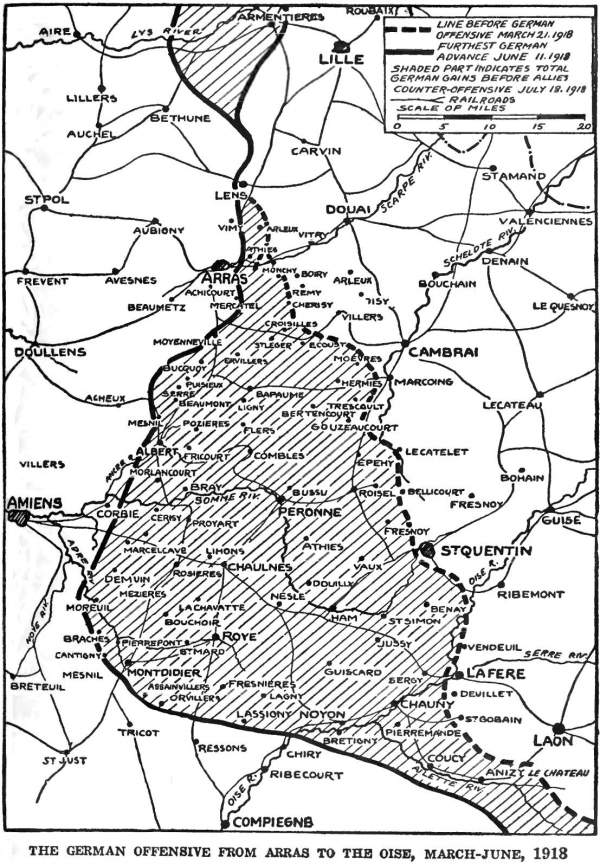
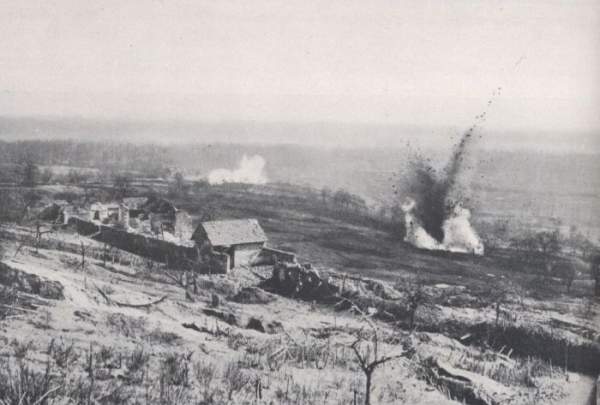
[In the morning a] most violent German artillery barrage was launched to our right . . . . The great battle for France had broken out. From La Fère to Croiselles, the German attack had commenced over a front of 70 kilometres. At 10 in the morning, the regiment already had news that the German offensive had gained an overall success . . . . It was clear to all of us that, in a brief time, we too would set out on the advance. 73
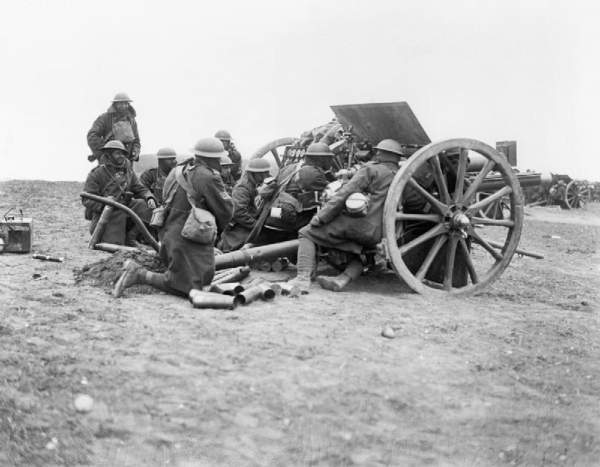
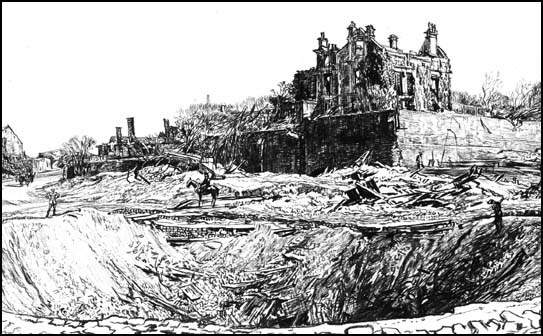
In view of the enormous extent of the greatly destroyed territory to our rear, which made bringing up all construction materials almost impossible, this work was effected with the greatest difficulty. In addition, the enemy now exerted all force, to prevent a further German advance. In violent attacks, the united enemy forces tried to throw us back again into the wasteland to our rear. 75
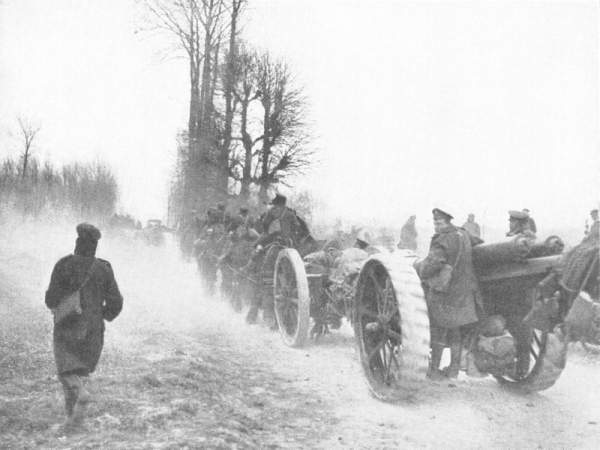
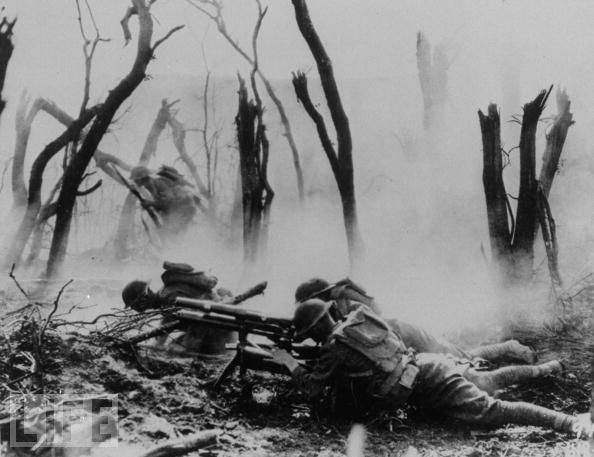
Night of 16-17 April; terrible artillery fire. Heavy gas bombardment around morning. Severe losses. In the evening, we marched to the most forward line with only 40 men [left] . . . . We got lost and ran into heavy artillery fire. 76
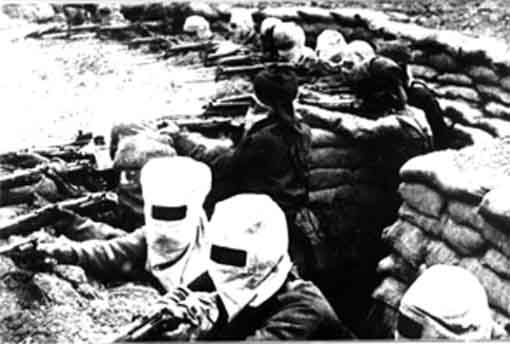
After a few days, not one house remained standing in the fire-zones, here and there were piles of rubble [as] mute testimony to the bloodiest events that had ever taken place on the face of the earth. On bright moonlight nights, the ruins loomed ghostlike over the wide battlefield, reaching heavenwards, as though in mourning for their former splendor.
[The] dispatch runners lay in the cellar of a badly damaged chateau . . . . Supplies [were] so inadequate, that a real famine broke out after eight days. Our group had to make [do] with a loaf of bread a day between us. Hitler and I often crept out at night and reached the terrain for livestock. Pieces were cut from the cadaver of a horse that was no longer fresh, and with overflowing hearts, handed to our culinary artist. Rain puddles supplied useful water to some extent. And if this made us sick, then it at least suppressed our hunger. The men were becoming jittery. After 26 days, it is high time we were relieved. 77
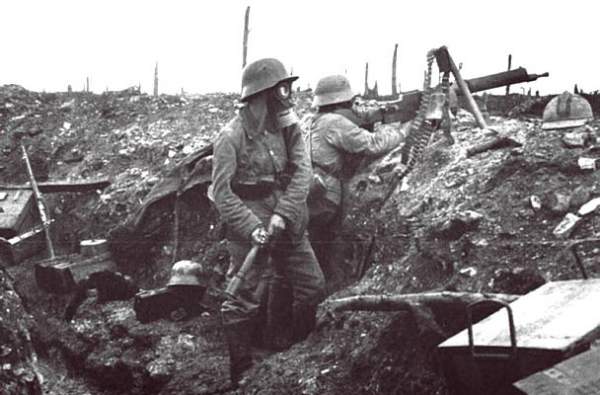
On May 1, we had not removed either shirts or trousers from our bodies since 16 March. Our faces had become old, our eyes reddened from the long, sleepless nights. Our uniforms hung from our bodies in rags . . . . For anyone who was there, the bloodbath and suffering are unforgettable. A picture of the war is forever in his memory . . . Montdidier [Fountaine]. 78
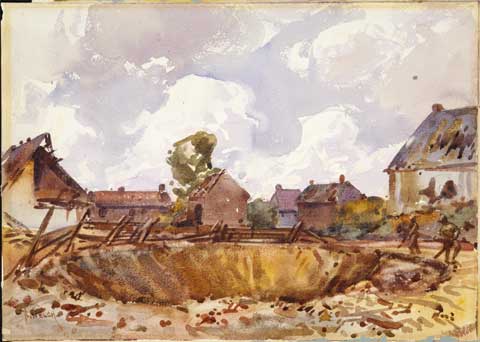
The severely decimated regiment holds a five kilometer front. To meet every attack, the valiant men have to be spaced five to six metres apart. In ten long days, and despite a fifteen-hour barrage, not one foothold is abandoned. We hang on jealously to each scrap of earth, wrestling with an implacable enemy. The German artillery is saving ammunition for the coming offensive on the Chemin des Dames. In the early morning of 15 May, the 6th BRD is relieved. Giddy and sick from the continued inhalation of deadly gases, we stagger back. Two dispatch runners [Hitler and Brandmayer] collapse into each other's arms. 79
1918 May 16 The 16th RIR is sent back behind the lines for ten days rest. Gefreiter Adolf Hitler is awarded a regimental citation for "outstanding gallantry" at Fountaine, and a Wound Badge (Category Black). 80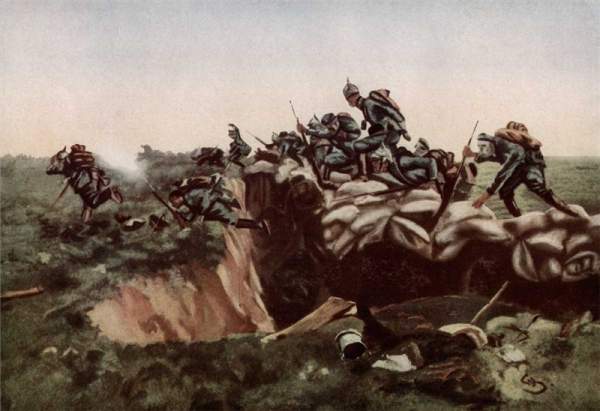
The enemy is scarcely able to defend himself. Up-hill, down-dale, through thick and thin, we follow on behind his fleeing heels. Trench warfare seems to have been overtaken in full flood by a war of movement.
With Hitler, I search for companies that are advancing surprisingly quickly. Searchlights start up and plunge path and wood into an abundance of glaring light. The Froggie [Franzmann] had, in between times, reassembled. He desperately resists our assault. We run through a raging fire. Fragments of exploding shells scatter among us. Their flat trajectories drive us to distraction. 81
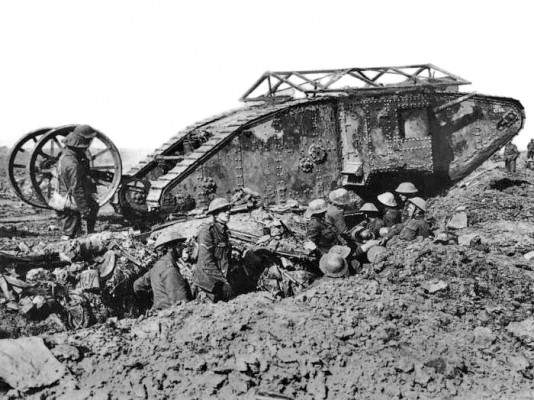
The descent into the Valley of the Marne, the countless smoking farmsteads, the advancing German assault columns and the peacefully flowing river offered an unforgettable sight to all 16-er's. 88
1918 July 17 The 16th RIR, participating in offensive operations on the Marne and in Champagne, holds a bridge to the south of Courthiezy. Adolf Meyer:That morning, the Americans opposite succeeded in punching through a guard division, creating a two-company-wide breach . . . . We still had a few minutes in which to tell our squad and group leaders about the situation, and instruct them. I called two sergeant majors, five sergeants and a corporal together for this purpose. Just as I was beginning to give the necessary clarification, the unexpected happened! A light-artillery shot landed plumb in our midst. The effect of this direct hit was rather horrific! Three dead and six wounded, myself among the latter. Right shinbone cracked, large shell splinter in the right knee, the left side peppered with tiny splinters . . . . [Fortunately], I soon lost consciousness . . . .
I'd been left for dead and left to lie where I fell. My situation was hopeless, anyway, and even the smallest, movement impossible. Increasing fire led me to imagine further American penetration . . . the barrage wandering, always closer, closer, always thicker, explosion after explosion, until finally a shell comes and rips me apart, before the hand of a doctor, be it German or from the enemy, could slake my agony.
I believe I would have to take my farewell from everything that was dear and valuable, forever, totally. After some days, they will find me, comrades or others. Everything passes, even the most horrific. Shortly before nightfall, two men in field-gray arrive. I am able to call out. They drag me to a place near Courthiezy and deliver me to the nearest first aid post. The helping hands are Gefreiter Schmidt and Gefreiter Hitler. 89
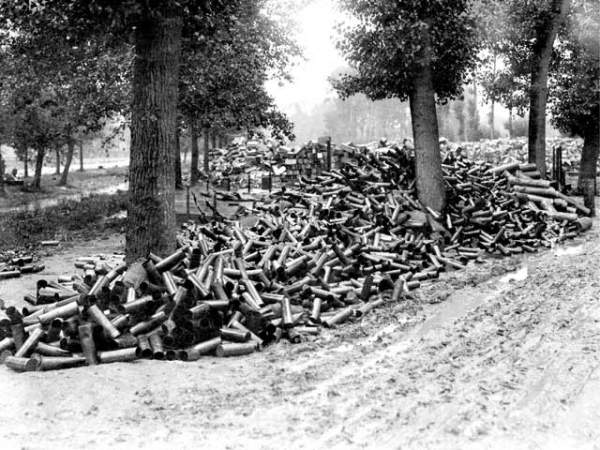
Aviators whirr in tremendous numbers through the air. They reconnoitre our positions and bomb them. The machine-gun infantry, artillery and marching columns. Sporadically, they fly high behind our lines and fire at a barrage balloon, which falls to the ground in flames . . . . The most frightening, however, are aircraft armed with anti-personnel bombs, which are in operation for the first time. Twenty-five, thirty, and more aircraft suddenly appear [and] each drops 40 bombs. We do not worry anymore about infantry fire [and] we have become used to artillery, but these pilots drive the troops to distraction. We literally climb up the trees, in order to avoid fearsome low-trajectory projectiles from the exploding bombs. 90
1918 August 4 Gefreiter Adolf Hitler is awarded the Iron Cross, 1st Class. The citation, dated July 31, 1918, is signed by Baron von Godin, the new regimental commander, and reads as follows:As a dispatch runner, he has shown cold-blooded courage and exemplary boldness both in positional warfare and in the war of movement, and he has always volunteered to carry messages in the most difficult situations and at risk of his life. Under conditions of great peril, when all the communications lines were cut, the untiring and fearless activity of Hitler made it possible for important messages to go through. Hitler received the Iron Cross Second Class for gallant conduct during fighting at Wytschaete on 1 Dec 1914. [He] fully deserves to be awarded the Iron Cross First Class. 91
By the summer of 1918, 51,000 German officers had been awarded the Iron Cross First Class, 17,000 NCOs, but only a mere 472 went to ordinary soldiers. 92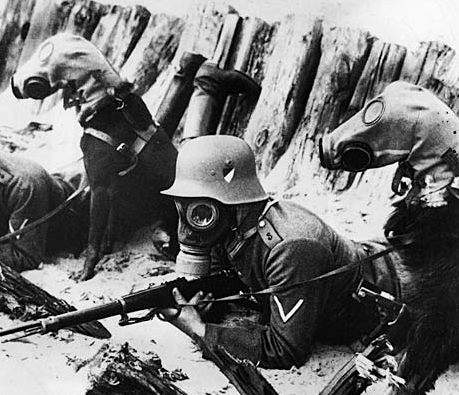
On the battlefront, the enemy launched a violent attack to the north of the Somme, and between the Somme and Lihons, in the early morning hours . . . . On both sides of Amiens . . . we turned back enemy attacks. Between the Avre and the Oize, strong attacks by the enemy lasted until nightfall. They were completely defeated. The French suffered especially heavy losses near Tilloloy. 93
1918 August 13 In a meeting with Chief of the General Staff Hindenburg, the German chancellor Count Georg von Hertling, and foreign minister Paul von Hintze, Ludendorff makes it clear that "we were not in a position to win the war militarily." 94Gun smoke and artificial fog lie over the forward battle-zone, the air is filled with gas and pitch-black clouds of smoke . . . . Hand-to-hand combat begins [as] murderous artillery fire sets in over the position. Fog, gas and explosive shells hissed through the air like a whirlwind; in no time, the terrain is covered in a single, opaque cloud. The English thrust forward out of Biefvillers.
With hand grenades in the belt, assault packs and rifles slung over their shoulders, [a Bavarian] company runs toward Bapaume road, man after man. The company has already broken through, [when] its leader falls from two bullets in the chest. Death also claims [his] battle orderly from the bullets of the Australians. An English commander, who had studied in Heidelberg, saves Lieutenant Rombach from certain death and the anger of his Australians, bandages him personally, and leaves him on a stretcher to be saved. 97
Herr Hitler, as corporal, was a courier for the regimental staff, and was not only always willing to carry out hard tasks, but did so with distinction. I stress that the List Regiment, as might be expected from its history, was at the toughest parts of the front, fighting in frequent major battles. 99
1918 August 26 The 16th RIR is relieved. The British First Army widens the Bapaume attack by another twelve kilometres; a conflict that is sometimes called the Second Battle of Arras.
Yes. Surely, I was affected by English yellow-cross gas and was almost blind for a while. Later my condition improved, but, with regard to my profession of architect, I saw myself as a complete cripple, and never believed that I would ever again be able to read a newspaper. 103
From Adolf Hitler's Mein Kampf:Now in the autumn of 1918, we stood for the third time on the ground we had stormed in 1914. The village of Comines, which formerly had served us as a base, was now within the fighting zone. Although little had changed in the surrounding district itself, yet the men had become different, somehow or other. They now talked politics. Like everywhere else, the poison from home was having its effect here also. The young drafts succumbed to it completely. They had come directly from home.
During the night of October 13th-14th, the British opened an attack with gas, on the front south of Ypres. They used the yellow gas, whose effect was unknown to us, at least from personal experience. I was destined to experience it that very night. On a hill south of Werwick, in the evening of October 13th, we were subjected for several hours to a heavy bombardment with gas bombs, which continued throughout the night with more or less intensity. About midnight, a number of us were put out of action, some forever. Towards morning I also began to feel pain. It increased with every quarter of an hour; and about seven o'clock my eyes were scorching as I staggered back and delivered the last dispatch I was destined to carry in this war. A few hours later my eyes were like glowing coals and all was darkness around me. 104
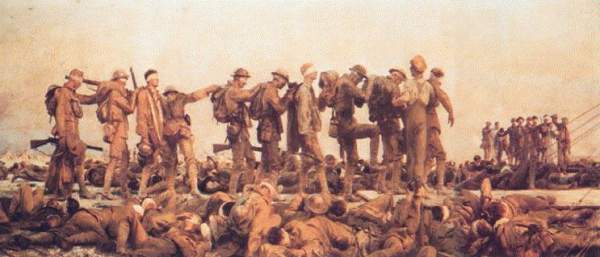
I was sent into hospital at Pasewalk in Pomerania, and there it was that I had to hear of the Revolution.
For a long time there had been something in the air which was indefinable and repulsive. People were saying that something was bound to happen within the next few weeks, although I could not imagine what this meant. In the first instance I thought of a strike similar to the one which had taken place in spring. Unfavorable rumors were constantly coming from the Navy, which was said to be in a state of ferment. But this seemed to be a fanciful creation of a few isolated young people. It is true that, at the hospital, they were all talking about the end of the war, and hoping that this was not far off; but nobody thought that the decision would come immediately. I was not able to read the newspapers. 106
On November 10th the local pastor visited the hospital for the purpose of delivering a short address. And that was how we came to know the whole story.
I was in a fever of excitement as I listened to the address. The reverend old gentleman seemed to be trembling when he informed us that the House of Hohenzollern should no longer wear the Imperial Crown, that the Fatherland had become a "Republic", that we should pray to the Almighty not to withhold His blessing from the new order of things and not to abandon our people in the days to come. In delivering this message, he could not do more than briefly express appreciation of the Royal House, its services to Pomerania, to Prussia, indeed, to the whole of the German Fatherland; and here he began to weep. A feeling of profound dismay fell on the people in that assembly, and I do not think there was a single eye that withheld its tears. As for myself, I broke down completely when the old gentleman tried to resume his story, by informing us that we must now end this long war, because the war was lost, he said, and we were at the mercy of the victor. The Fatherland would have to bear heavy burdens in the future. We were to accept the terms of the Armistice, and trust to the magnanimity of our former enemies. It was impossible for me to stay and listen any longer. Darkness surrounded me as I staggered and stumbled back to my ward, and buried my aching head between the blankets and pillow. 110
The following days were terrible to bear, and the nights still worse. To depend on the mercy of the enemy was a precept which only fools or criminal liars could recommend. During those nights my hatred increased—hatred for the originators of this dastardly crime.
During the following days, my own fate became clear to me. I was forced, now, to scoff at the thought of my personal future, which hitherto had been the cause of so much worry to me. Was it not ludicrous to think of building up anything on such a foundation? Finally, it also became clear to me that it was the inevitable that had happened, something which I had feared for a long time, though I really did not have the heart to believe it.
Kaiser Wilhelm II was the first German Emperor to offer the hand of friendship to the Marxist leaders, not suspecting that they were scoundrels without any sense of honor. While they held the imperial hand in theirs, the other hand was already feeling for the dagger.
There is no such thing as coming to an understanding with the Jews. It must be the hard-and-fast 'Either-Or.'
For my part I then decided to become a politician. 112
End of Part Eight.
Next: Spy



Written by Walther Johann von Löpp Copyright © 2011-2013 All Rights Reserved Edited by Levi Bookin — Copy Editor European History and Jewish Studies






Disclaimer:The Propagander!™ includes diverse and controversial materials--such as excerpts from the writings of racists and anti-Semites--so that its readers can learn the nature and extent of hate and anti-Semitic discourse. It is our sincere belief that only the informed citizen can prevail over the ignorance of Racialist "thought." Far from approving these writings, The Propagander!™ condemns racism in all of its forms and manifestations.
Fair Use Notice: This site--The Propagander!™--may contain copyrighted material the use of which has not always been specifically authorized by the copyright owner. We are making such material available in our efforts to advance understanding of historical, political, human rights, economic, democracy, scientific, environmental, and social justice issues, etc. We believe this constitutes a "fair use" of any such copyrighted material as provided for in section 107 of the US Copyright Law. In accordance with Title 17 U.S.C. Section 107, the material on this site is distributed without profit to those who have expressed a prior interest in receiving the included information for research and educational purposes. If you wish to use copyrighted material from this site for purposes of your own that go beyond 'fair use', you must obtain permission from the copyright owner.